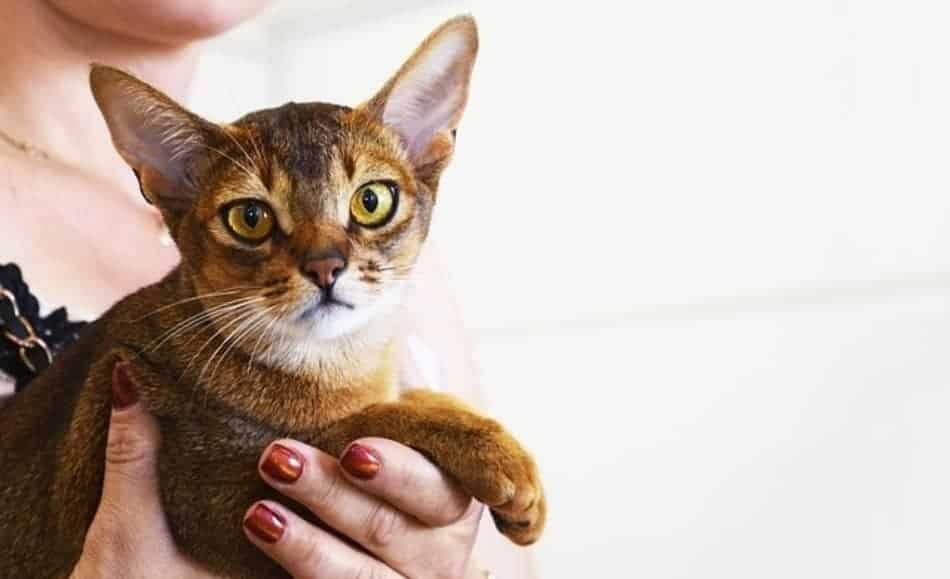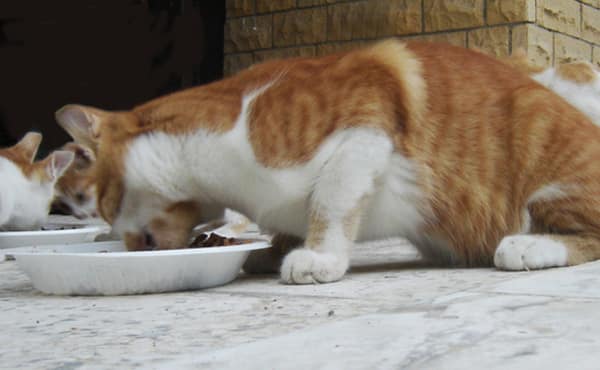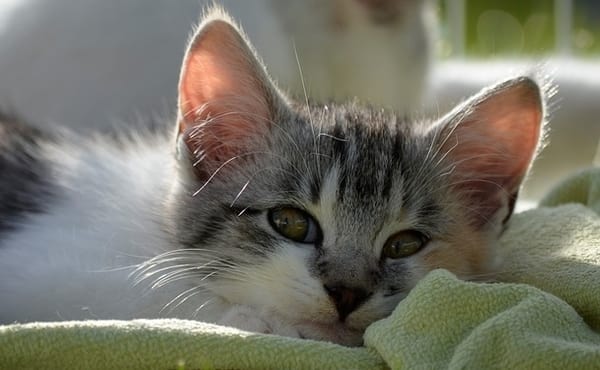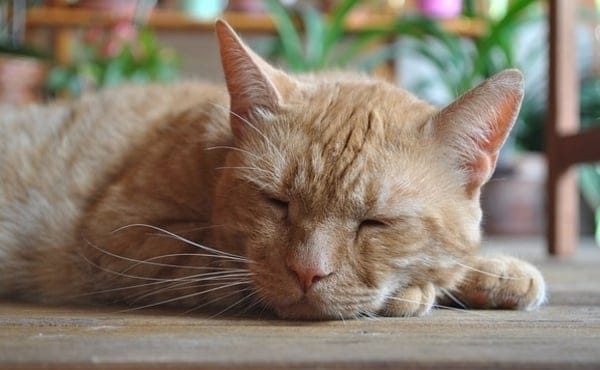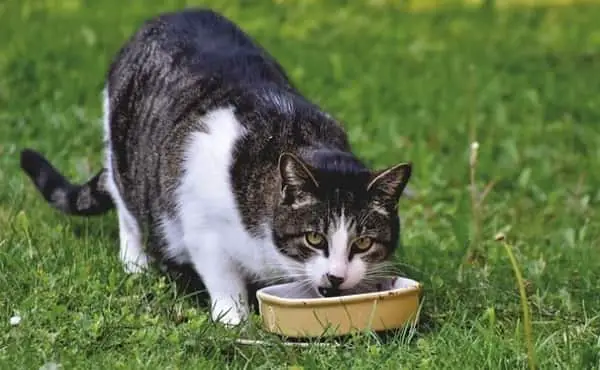Cats and kittens are known for being adorable, playful, graceful, and athletic. Bringing a new kitten home is always exciting and joyful, so sometimes when your little ball of fluff starts passing gas when you pick them up, it can be a little unexpected.
So, why does my kitten fart when I pick him up? The most likely reason is that your kitten’s diet is somehow disagreeing with his stomach, although there are a few other things it would be smart to rule out.
This article will examine how your kitten’s diet may affect the digestive tract, parasites that could be causing these caustic problems, common gastrointestinal (GI) issues in cats, and the possibility that your hungry little pal may be eating just a tad too quickly.
You Are What You Eat
Despite their poised reputations, cats and kittens absolutely experience flatulence, just like the rest of us, although most of the time it is not quite as detectable. This is usually because a cat’s diet tends to be simpler, albeit more specific, than other mammals.
Cats are obligate carnivores, meaning they rely primarily on animal-based proteins and fats for their nutritional needs, along with amino acids, some carbohydrates, and micronutrients.
So, if you have a gassy feline at home, it is not necessarily cause for concern. However, if you have noticed that your kitten is more flatulent than usual when you pick it up, it might be experiencing higher levels of gas due to its diet.
First, ask yourself if you have switched your kitten’s food recently? If so, your kitten may be experiencing some digestive distress due to a drastic change in their diet. If you switch a kitten or cat’s food too quickly, it can cause GI stress, which leads to flatulence, among other problems.
If you have only recently changed their diet (within the last 24-48 hours) consider purchasing their previous kind of food, and gradually switching over a period of seven to ten days. If it has already been several days, you may need to “hang in there, kitty,” and have your veterinarian’s number handy, just in case your kitten’s tummy starts rumbling a little too much.
If switching food is not the issue, take a closer look at the quality of your kitten’s diet. As mentioned above, cats need lots of animal-based protein and fat, and little carbohydrates and other nutrients. While they do need a small amount of fiber, most plant-based food material, especially plant-based proteins like soy, beans, and peas, are not digestible for your feline friend.
Cats lack the enzymes needed to break down cellulose that are present in omnivorous animals like dogs and even humans. Further, plant-based materials will linger too long in a cat’s digestive tract, resulting in discomfort and flatulence. Many lower quality commercial cat foods contain plant-based fillers in volumes that are simply too high for some cats to digest.
These fillers end up cutting the nutritional value of the food, resulting not only in your friend’s smelly problem, but also in overeating, obesity, and long-term health problems. If the first ingredient in your kitten’s food is not meat, consider switching (gradually) to a higher-quality food for your kitten’s sake, and for your nose’s sake.
Finally, contrary to popular belief, milk and other dairy products are not good for kittens and cats. Once a kitten is weaned, the enzyme required to digest milk goes away as it is no longer necessary, and lactose intolerance becomes common.
Just like in humans, consuming lactose when one is lactose intolerant results in discomfort and gas. Further, steer clear of “people food” in general for kittens and cats. Although some foods are technically safe for your feline friend, feeding them will usually lead to a nutritional imbalance that can result in—you guessed it—gas.
If you are already feeding your kitten high-quality, kitten-specific food and do not suspect the food itself or a recent switch is causing your kitten’s caustic commotion, it is time to check them for parasites.
Stinky Stowaways
Cats are uncannily clean creatures, which is part of their appeal as house pets—as mammals go, they are seriously low-maintenance (for the most part). However, just like most other animals, they are highly susceptible to parasites, including intestinal parasites. And yes, this does include your lazy housecat.
Your kitten can be exposed to parasites pretty much anywhere, including the breeder, pet store, or shelter where you first laid eyes on your tiny new friend. Other common areas of parasite exposure are kennels, parks, and lawns—even your own lawn!
Usually this is because of exposure to the fecal matter of other animals but can also be the result of contact with another animal or material (like bedding or blankets) used by that animal.
Some common intestinal parasites in cats and kittens include roundworms, hookworms, and tapeworms, all of which are easily treatable at your vet’s office. Dewormers are available at most pet stores, but it is often difficult to determine for yourself what kind of worm you need to treat, so it is best to consult your veterinarian.
There are also protozoan parasites, which are much smaller, typically one-celled organisms that cause GI infections. One of the more common protozoan parasites in North America is called giardia, which is found in many freshwater sources across the country.
The infection rate in cats is typically low (around 5%), but diagnosis and treatment are a little more complicated than your typical worm, so it is a good idea to rule it out early.
Another common protozoan parasite is called isospora, which is much more common in cats, with virtually all cats believed to be infected with it at some point in their lives, and to which kittens are particularly vulnerable.
If you notice that your kitten has only recently started its flatulent overtures, and has other symptoms such as vomiting, diarrhea, distended stomach, decreased appetite, and/or blood in the stool, schedule an appointment with your veterinarian right away, and expect to bring a fecal sample to the appointment with you.
With vigilance and proper treatment, your flatulent feline will be back to its demure self in no time. If you do not suspect worms or creepy critters stowing away in your kitten’s tummy, there may be some common GI issues at play.
G.I. Kitten
Due to the specific dietary needs of cats and kittens, their gastrointestinal tracts, or GI tracts, can be quite sensitive. As discussed earlier, even something as simple as switching your kitten’s food could cause GI distress.
These issues can be caused by all manner of things, however, such as exposure to other animals’ feces (as with parasites), ingestion of non-food items or infected pests, or even ingestion of something as simple as grass.
Sometimes GI problems can even be attributed to allergies, be they food allergies or environmental allergies such as fleas, smoke, or certain plants. For these reasons, it is best not to attempt to diagnose your kitten yourself, but always consult a veterinarian for diagnosis and treatment.
Some of the more common GI tract problems cats and kittens suffer from include inflammatory bowel disease, colitis, constipation, malabsorption, certain cancers, and feline enteric coronavirus. All of these, and several other conditions, usually manifest in several, non-specific symptoms for which you should be on the lookout:
- Abdominal bloat and/or stomach sensitive to touch
- Vomiting
- Diarrhea
- Decreased appetite and/or weight loss
- Excessive drooling
- Bloody stool
- Tumors or lumps
If your kitten is displaying any of these signs, bearing in mind that this list is by no means all-inclusive, in addition to new or uncharacteristic gassiness, schedule an appointment with your veterinarian right away for treatment. Most of these problems are treatable and your kitten will be good as new, playing and passing gas as usual.
If none of the above factors or scenarios seem to fit your kitten’s gassy fits, there is one more thing to consider—your pal may sometimes act a little more like a piglet than a kitten.
Food Vacuum
A love of food is something that seems to transcend the lines between species. We humans love our food, dogs love food, animals from elephants to mice love food, and cats are no different. Some animals, however, take that love to another level in the form of eating too fast.
Sometimes kittens end up practically inhaling their food, which results in them also ingesting copious amounts of air along with their dinner. Eating in this manner also sometimes results in overeating, especially in kittens who are given dry food to free feed on throughout their day.
Because of this excess air and food, digestive distress takes place resulting in gas and discomfort.
Eating this way may be from having a particularly food-driven kitten, a kitten with a case of FOMO (fear of missing out!), or from a kitten who feels there is too much competition for food in the home (or came to you from a place where there was too much competition). This fear often drives animals to eat quickly, lest they not eat at all.
If your kitten is eating too quickly, do not worry—there are few things you can do to help them out. First, if there are multiple cats in your household, ensure they all have their own dishes, and feed them separately to eliminate the feeling of competition.
Further, consider breaking up your kitten’s meal times. Usually, given kitten’s higher nutritional needs, they should be fed around four times per day. However, you can easily make that six if need be.
Conversely, you can add a non-edible obstacle to their meals such as a ping pong ball, or try a “slow feeder” bowl, which is a sort of patterned/puzzle bowl that forces your pet to eat more slowly. Finally, wait to feed your feline until after they have had a play session when they are less energetic and can digest their food more easily.
Regardless of how you approach it, if you exercise patience you will figure out what works for your furry little feline piglet and you will both be all the happier for it.
Conclusion
If your kitten has been assailing you with flatulence when you pick it up, it likely has something to do with how their diet is sitting in that little tummy. Gas is normal in cats, but if it is uncharacteristic, it is smart to assess your little pal’s diet and eating habits to be safe.
Your kitten may also have been exposed to a parasite at some point, which is normal and nothing to feel guilty about, so make sure to rule that out with a vet visit as soon as possible. Further, your kitty could be suffering from a GI problem, which can vary widely, so again consult your veterinarian right away if you suspect tummy trouble.
Finally, your little one may just be extra enthusiastic about its meals and is eating too fast. In this case, there are multiple steps you can take to slow them down.
Regardless of what is causing this caustic commotion in your kitten’s tummy, if you are patient and observant, you will be able to take care of it and restore your kitten to its playful, dignified, and certainly un-smelly self in no time.

